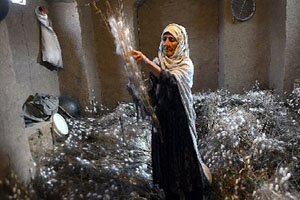
Zandajan district of Herat province become a major silk farming centre
YarnsandFibers News Bureau 2017-09-07 15:00:00 – Herat cityOnce at the heart of the Silk Road trade route, the Zandajan district in western Herat province in Afghanistan has a long tradition of producing silk used to weave carpets and silk due to abundance of mulberry bushes has become a major centre for cultivating silkworms, according to residents.
However, the silkworm industry, a 2000 years old tradition, had been on the decline in the past in Zandajan, but with the help of some foreign NGOs was rescued and strengthened.
Besides women, men also play a crucial role in keeping silkworm industry alive. They help women provide the insects their only food -- mulberry leaves.
However, both the men and women working in the traditional silk industries, said that the government should find good markets for silk threads and products outside the country.
The once flourishing silk trade that it was so proud of has been threatened by cheaper foreign imports which threatened generations of silk making families.
However, the Department of Agriculture has now offered the families of Herat a lifeline - by providing some 5,050 silkworm boxes to several districts to revive silk production in the region.
Some 42,500 women and their families are involved in the project which aims to provide a means of subsistence and potentially lead the international market access for silk producers in the country.
The popular wool and silk Afghan carpets made by different tribes can sell for a price that can cost thousands of pounds. Hence the families involved in cultivation have urged the government to make sure silk products produced in Afghanistan were sold at reasonable price in foreign markets.
Herat is ideal as the mulberry trees which the silkworms feed on thrive in the dry climate.
Market Intelligence
Ask for free sample Report

experience
Customer Base
dedicated team
Countries Served Worldwide









